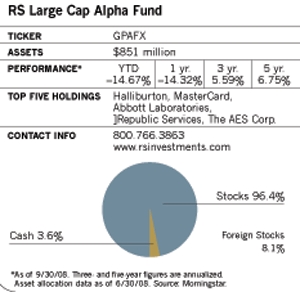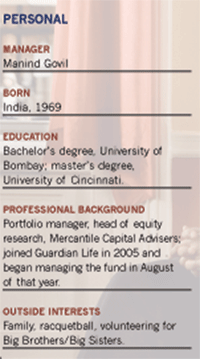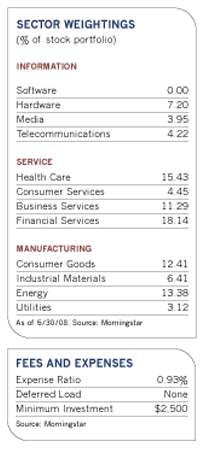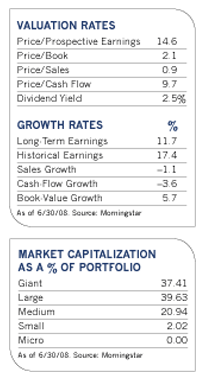When MasterCard launched an initial public offering in 2006, a small group of institutional investors was interested in getting in on the deal at $39 a share. Among those investors was Mani Govil. "It was one of the coldest IPOs I'd seen in a long time," recalls the 39-year-old manager of the RS Large Cap Alpha Fund.
He normally doesn't participate in IPOs at all. But this one intrigued him. MasterCard gets a small transaction fee every time someone takes a card from one of its thousands of issuing banks or other institutions, and gets additional fees from others in exchange for the right to issue its cards. Most investors evidently saw in MasterCard only a boring company that cleared credit card transactions and had been owned by an association of banks. But Govil saw a sleepy yet profitable franchise with a recognizable brand name that he believed could grow exponentially as a for-profit company.
As banks and others in the financial sector reel from bad loans and a sour economy, MasterCard, now Govil's second-largest holding, remains largely unscathed by a slowdown in consumer spending and consumer debt troubles in the U.S. Card-issuing banks swallow all the underlying credit risk, while MasterCard rides the powerful global secular shift from cash to credit and debit payment mechanisms. Most of its earnings come from outside the U.S., where many consumers are only beginning to become acquainted with the power of plastic. Since the offering, MasterCard's earnings have tripled, and its stock has jumped to more than $200 a share.
Like MasterCard, other holdings in Govil's large-cap fund often have hidden charms that most investors don't initially recognize. What attracts him most to a stock is some aspect of its business that will allow it to outperform its competitors even in the toughest times. In some cases, a company's edge could be its growing market share. Or it might have a stellar balance sheet or prudent lending practices. Whatever its sustainable competitive advantage, his stock pick must be well positioned for consistent revenue and earnings growth.
Govil also weighs potential upside against downside risk. "The economy is going to be in for more challenges over the next year or two, so the focus is on companies that can make money in a soft economic environment and participate on the upside when things improve," he says.
To Govil, the key to successful investing is limiting losses and avoiding blowups. That means looking not only at how a company can make money, but examining the points of vulnerability that can trip it up. Govil learned about stock picking from a high school mentor in his birth country of India (he migrated to the U.S. to obtain his master's degree). Govil estimates that he and his staff of ten analysts spend about 40% of their time traveling to get the full story on a company from its managers, suppliers and competitors.
Competitive advantages and prudent practices are as important to him as traditional valuation measures. In the financial sector, which accounts for 18% of his assets, he has sidestepped credit-sensitive bank and insurance stocks in favor of lesser-known plays such as top-ten holding People's United Financial, a bank Govil began buying in 2006 that operates mainly in Massachusetts and Connecticut. As most banks dived into the subprime lending market, People's kept its loan books clean. Its capital ratio, a widely used benchmark of a bank's fiscal health, is north of 19%. To be considered well-capitalized by regulators, a bank's capital ratio must represent more than 10% of risk-weighted assets. People's has $2.5 billion, or roughly 44% of its $5.7 billion stock-market value, in cash.
Though the stock is nearly flat this year, the S&P 500 regional banks index, by comparison, has lost 30%.
Since he took over the fund in August 2005, Govil has bucked the notion that managers can't add value in the overmined large-cap space. In 2006, under his first full year of management, the fund's 16.9% total return beat its Morningstar large-cap blend average by 2.7%, and the following year its 14.8% total return beat the average by nearly 9%. As of September, the fund was down about 4.5%, putting it about 7% ahead of the S&P 500.
The fund, which was called RS Core Equity until mid-October of this year, had a rocky history before Govil took over. It was originally known as the Guardian Park Avenue Fund and went through several management changes after longtime manager Charles Albers left in 1998 to join Oppenheimer. Govil joined in 2005 after nine years at the helm of Mercantile Capital Advisors' Growth & Income fund, where he had built a solid track record.
"Govil has now nearly three years at this fund under his belt, and he's shown his commitment to shareholders by storing more than $1 million of his own assets in the fund," wrote Morningstar analyst Marta Norton in a recent report. "Not only does that suggest that he's here for the long haul, but it also shows his confidence in his strategy." At the same time, she believes that the fund "should perform better in choppy markets than in speculative rallies."
The RS Large Cap Alpha doesn't piggyback the benchmark but it does use the Standard & Poor's 500 index loosely as its bogey. Most of the fund's 58 holdings come from outside the S&P 500, and the index accounts for only 15% of invested assets. The fund's weighted average market capitalization is $44.7 billion, much smaller than the $90.6 billion for the index, which indicates Govil's willingness to reach into the lower end of the large-cap range, even into what some would consider midcaps. RS considers a company to be large cap if its market capitalization is between $550.4 million and $474.3 billion, the same range used by the Russell 1000 Index.
"On the one side, you have closet indexers and on the other you have managers who go all over the board," Govil says. "I think this fund strikes a good balance between the two extremes."
Govil will stay within sight of the benchmark, but allow his sector weightings to deviate from the index's weightings by as much as ten percentage points in either direction, which gives him ample discretion. He now has a presence in all the index sectors except materials, which he exited about a year ago when he felt that "all the low-hanging fruit had been picked, and that we were in the latter innings of the commodity cycle." Although he admits the move out of materials may have been a bit early, he still believes the commodity price cycle has about run its course.
Health care has been the most prominent overweighting in the fund for about a year against the S&P 500 index. He believes that the health care group is seeing both strong demand growth and effective insulation from economic pressures, as well as valuations that are "the best I've seen in over 15 years."
Schering-Plough, his most recent purchase in the group, has no key drugs coming off patent before 2015. He believes the market is not giving the company full credit for its higher growth rate and superior new drug development pipeline, which contains several late-stage candidates to treat a variety of illnesses. Top ten holding Celgene produces the leading drug for treating blood cancer and has a number of other compelling products in the pipeline.
Another recent purchase, Republic Services Group, is the country's third-largest trash hauler. Govil moved in to buy the company after its planned merger with Allied Waste was announced and sparked a sell-off of Republic's stock.
He believes that the two companies together will have stronger pricing power in the market and can save significant costs in the long term.
Halliburton, the fund's largest holding, accounts for about 6% of assets. While a sustained downturn in oil and natural gas prices could spook investors, Govil believes the company has superior technology and is well-positioned to take market share from others in the oil services industry. The company also benefits from generally rising global drilling activity and its growing international presence.
Nokia, the world's largest mobile handset producer, has been one of the biggest drags on the fund's performance this year. The company posted substantial gains in 2007, but investors began to sell off the stock in 2008 when they became concerned about weaker global economic growth and increased competition from Apple's iPhone and other devices. Govil believes these issues are more than reflected in the company's current discounted stock price, however, and that with its superior market share, Nokia is positioned to deliver good performance regardless of economic conditions.












